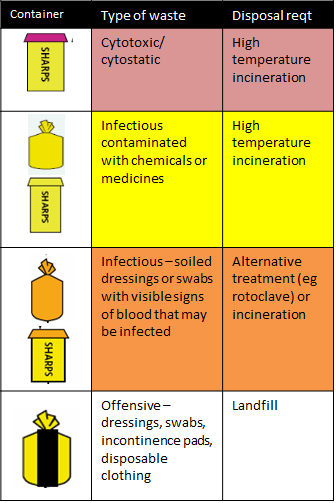Healthcare Waste
Summary
Healthcare waste is waste that is produced specific to healthcare activities i.e. it does not include typical domestic or commercial waste that comes out of a healthcare facility.
Definitions
There are key definitions that define the hazardous nature of the wastes and the method by which they should be disposed.
- ‘Clinical waste’ is defined as any healthcare waste which unless rendered safe, may prove hazardous or may cause infection to any person coming into contact with it. Clinical waste is therefore hazardous waste with two exceptions:
- Segregated non-cyto medicines
- Similar waste from municipal sources not associated with Healthcare
- ‘Infectious waste’ is defined as waste that poses a known risk of infection and is hazardous.
- Generally, healthcare waste should be considered as infectious unless it is has been assessed as being non-infectious from a patient-specific clinical assessment or is clearly from a non-infectious environment eg maternity.
- ‘Offensive waste’ is healthcare waste (or similar waste from municipal sources), which is not hazardous but which may cause offence to those coming into contact with it.
- ‘Medicinal waste’ includes expired, unused, spilt and contaminated pharmaceutical products, drugs, vaccines and sera
- Non-cyto medicines and cyto medicines cannot be mixed for disposal.
- Non-cyto medicinal waste is non-hazardous.
- ‘Sharps’ are items that can cause cuts or puncture wounds including needles, scalpels etc. They do NOT include syringe bodies and the residual medicine they contain or medicinal waste.
Detrmining whether healthcare waste is hazardous or not is a combination of the EA’s WM3 document and the DfH document shown below based on the broad categorisation above.
Colour classifications
There is now a standard container colour system in place for healthcare waste:

Management of Healthcare waste should be carried out according to the Department for Health ‘Safe Management of Healthcare Waste’ document.
Pre-acceptance audits
The disposal of healthcare waste should only be through facilities permitted to receive the specific EWC codes associated with it (EWC chapter 18). Pre-acceptance audits are required by these facilities before they can accept waste from any healthcare waste producer.
These audits are must be undertaken by the producer prior to the delivery of the first batch of waste to a permitted facility and then at the following minimum frequencies:
- every 12 months for each medical practice that produces five tonnes or more of clinical waste in any calendar year;
- every two years for each veterinary practice, dental practice and laboratory that produces less than five tonnes of clinical waste in any calendar year;
- every five years for other healthcare producers of clinical waste.
Duty of care
One of the biggest issues for healthcare waste producers is ensuring that waste is properly segregated. Under best practice, offensive and infectious waste should never be mixed, but it is common to see infectious waste containers filled with non-infectious waste, either waste that should be placed in the offensive waste bin or even waste that should be placed in the black bag or recycling bin. As well as being a compliance issue, this also sees healthcare trusts incurring huge unnecessary cost.
Under NHS restructuring, trusts will often share buildings with GPs surgeries and other healthcare-waste producing organisations but will have all the waste collected under site arrangements. As with all multi-tenanted buildings, the producer of the waste is the business that produces it, not the FM or property company that manages it on behalf of the tenants. The EA therefore expect bags to be separately tagged to identify each producer and for the producers to be identified on consignment notes for hazardous waste.
360 support
360 Environmental is well versed in healthcare waste compliance and economic management. For assistance with:
- Compliance audits
- Waste management audits
- Waste service optimisation
- Cost control
